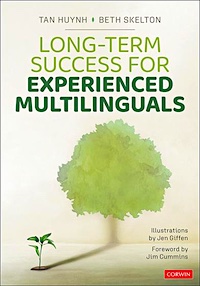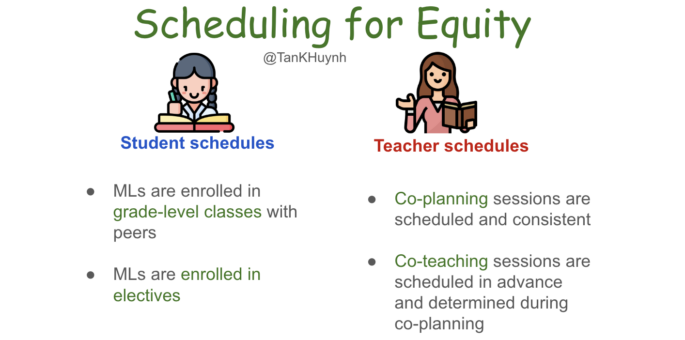Equity for MLs Begins with Equitable Schedules
A MiddleWeb Blog

Additionally, equity for multilingual learners (MLs) can be found in teacher and student schedules.
Equity for MLs means they are scheduled into both core content classes (e.g. math, science, history, social studies) and electives (e.g. music, drama, design, art).
They are scheduled into core content classes because they deserve to have access to on-grade level, rigorous curriculum taught by content experts.
In schools committed to equity, MLs are not scheduled into alternative forms of these content classes just for MLs and frequently taught by the EAL (English as Additional Language) teacher. Often these courses lack academic challenge because they are “watered down” to reduce the academic language load.
MLs can learn rigorous standards when lessons are intentionally scaffolded to meet their needs (Echevarría et al. (2017). Being new to English does not mean students have a cognitive deficiency. If anything, the ability to learn content in another language is a mark of intelligence.
And MLs need to be in elective classes as well. These classes provide students with opportunities to express themselves through the arts, sports, coding, and design. We would not want to rob a student who excels in visual arts of the opportunity to refine their skills and the opportunity to shine.
Additionally, these elective classes provide students with enriching cognitive skills where they have to analyze, evaluate, reflect, innovate and synthesize.
Finally, by enrolling in elective courses, MLs receive additional opportunities for English language development in the context of authentic content. Just like in content classes, if MLs need support in these classes, content teachers can learn how to develop specially designed lessons for MLs.
There is some rationale for beginners to English to bypass one period of elective classes to have additional English instruction, but make sure this is for a short period of time (e.g., a semester or one year). A 6th grader who is new to English might not have design class in 6th grade but will enroll in it the following year.
Finally, for equitable learning, MLs need to be enrolled in their heritage languages if that language is offered at school. For example, a Thai 4th grader who is new to English should still be enrolled in Thai language class at their international school based in Thailand.
Decades of research suggests that high proficiency in one language can aid the acquisition of another language (Cummins, 2021). If schools want their MLs to acquire English effectively, then one of the best things they can do is to schedule heritage language classes by default.
Teacher Schedules
Teachers – principally the English as an Additional Language teachers – play a keystone role in equitable learning for MLs. Their schedules contain a mix of co-planning time with colleagues, periods of co-teaching, and time to lead differentiated English classes.
Co-planning and collaboration time is essential to equitable learning for MLs. During these sessions the content teachers and EAL teacher collaborate to scaffold assignments and learning experiences. They can decide the teaching model that best meets the learning objectives. Additionally, they can pour over student work to determine the next course of action.
These co-planning sessions are scheduled automatically at the beginning of the year to facilitate year-long collaboration. Do not find “spare” time to collaborate after a schedule is made. Intentionally design a schedule that already integrates planning time for teachers by default.
In essence, the scheduled recurring collaboration between the content teacher and EAL teacher makes learning grade-level content a promise fulfilled, not an aspirational dream.

During these periods, the person with more content expertise might lead one part of the lesson, and the other person leads instruction related to academic literacy such as reading an article or writing a report. The EAL teacher can provide small group instruction to any student that needs support in accessing content or communicating content-based ideas.
Equity Depends on Schedules
Equity is rooted in a school’s policies and mission statement but bears fruit in students’ and teachers’ schedules. Schedules protect what schools value. They provide teachers with time to support students as they access the complete curricular offerings of the school. If schools want to know if they are providing equitable learning experiences for their MLs, look first at teachers’ and students’ schedules.
References
Cummins, J. (2021). Rethinking the education of multilingual learners: a critical analysis of theoretical concepts. Multilingual Matters.
Echevarría, J., Vogt, M., & Short, D. (2017). Making content comprehensible for English learners: the SIOP Model. Pearson.

Tan often presents internationally to schools and districts to support their work with multilingual students. Tan also hosts a blog, online courses, and a podcast about teaching multilinguals. Contact him at Tan@tankhuynh.com and follow him @TanKHuynh on X-Twitter.































